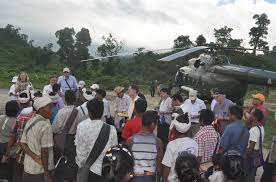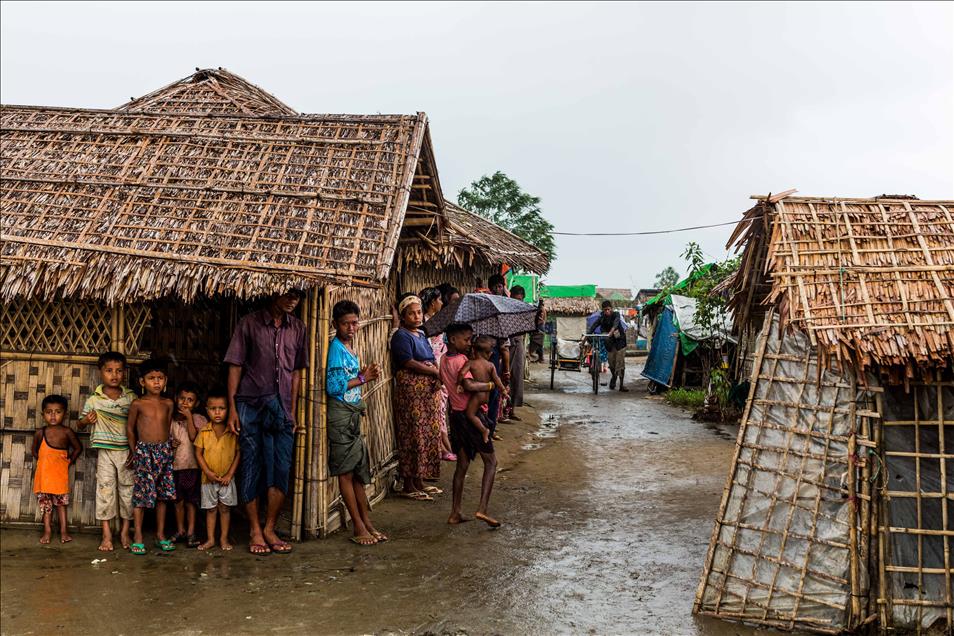
Full phase repatriation will help Myanmar Junta to gain some trust in the international arena.
Amit Thakur
Myanmar recently arranged a visit for the ambassadors or Consul Generals of 11 countries, including Bangladesh, India, China and eight ASEAN countries to Rakhine. The visiting envoys have observed that the security situation in Rakhine is now stable. It is favorable to start the repatriation process. The question is whether Myanmar will start the repatriation process this time or will it end in smoke?
In November 2017, three months after the Rohingyas were expelled from Rakhine, Bangladesh signed a repatriation agreement with Myanmar. However, no progress has been made in the repatriation of Rohingya in the last six years. In 2018, Bangladesh and Myanmar failed to begin a round of repatriation within the time frame specified. China later mediated attempts to resume repatriation in 2019, but nothing came of it. Myanmar’s military seized state power in a coup in February 2021. Following this incident, the discussion about Rohingya repatriation came to a halt.
Previously on June 24, a list of a total 830,000 Rohingya was given to Myanmar by the Bangladesh government. After verifying this list provided by Bangladesh, Myanmar announced to take back about 58 thousand Rohingyas.
Diplomatic sources say a small-scale return of Rohingyas to Rakhine has been under discussion since 2020 after China joined the repatriation talks. China has been pressuring Myanmar on this issue for several months. Although not going deep into the Rohingya problem, ASEAN, the alliance of Southeast Asian countries, also wants repatriation to begin, albeit on a small scale. The exclusion of Myanmar Junta from the ASEAN Summits and the mounting pressure at the international arena after UN Security Council resolution, extending sanctions from different countries are working as the catalysts to project the initiative for Rohingya repatriation as the softening attitude towards Myanmar Junta government.
Bangladesh and Myanmar are collaborating to launch a pilot project for the long-awaited Rohingya repatriation before this year’s monsoon. Bangladesh has already handed over a list of over 1,000 Rohingya citizens for repatriation, which the Myanmar government has quickly verified. The Myanmar government is arranging for the rehabilitation of Rohingyas in Rakhine. The Rohingya nationals who have returned will be welcomed at two reception centers in Rakhine.

Without bringing the internally displaced persons of Myanmar into their own villages, the faith of Rohingyas towards “safe, dignified and sustainable repatriation” will be a far cry.
On the first day of their visit, the envoys were reportedly shown the renovations being made to the interim camp that had been set up five years earlier in the village of Naquiya on the banks of the Naf River, directly across from the Teknaf border. It was announced that individuals who would be returned to Myanmar by boat would spend the first several days there. They will later be transported to Maungdaw’s Lapukha camp. They will remain there for a month before being relocated permanently to camps being built close to Maungdaw and Sittwe.
Myanmar is not a Westphalian state. It should not be considered like other nation-states under state governance. With a long history under military rule and the enormous ethnic diversities, all regions have their peculiar characteristics of law and order. In Rakhine, where clashes with the Arakan Army and the military are a common scenario, has been enjoying a better law and order since the ceasefire signed on November 24, last year brokered by the Nippon Foundation’s Yohei Sasakawa.
In Rakhine, the security situation for Muslims is better than it has ever been. In addition to this, facilities for livelihood, health, and education have improved. The number of Muslim-specific educational establishments has expanded. After a nine-year break, 230 Muslim students were enrolled to Sittwe University last year. This year, a significant number of Muslim students were also accepted. Muslims have access to medical care as well.
Regarding repatriation, the Rohingyas have mixed opinions as they have long distrust of the Junta and the fear of persecution still young in their mind. But there is no doubt that a journey of a thousand miles starts with a single step. The pilot project is that small step that needs to be taken into place.
On the other hand, the deadline for Myanmar’s counterargument in the Rohingya genocide case at the International Court of Justice (ICJ) has been set for April 24 this year. To some experts, the sudden repatriation plan has connection with the genocide case. However, there is no chance to get rid of the responsibility of genocide just by starting repatriation. But Myanmar may want to convince the ICJ, along with the international community, that they are taking steps to improve the situation.
Bangladesh is under stress from more than 1.2 lakh Rohingyas. Each year, this number rises by 35,000 newborn babies at the camps. The Rohingya problem has received less attention from the international community as a result of the ongoing Russia-Ukraine war. Due to the financial crisis, the World Food Organization (WFP) has started budget cuts for the Rohingyas by 17% since March 1st 2023. Day by day, the law-and-order situation in the Rohingya camp gets worse. Erupted fire at the camps, increased criminalities, threats of terrorism and insurgency, environmental pollution, human and drug trafficking, demographic imbalance in the host community are the realities of Rohingya crisis now. Bangladesh wants the Rohingya repatriation to begin in this connection, regardless of how smaller the number is!
From the above discussions it can be said that the repatriation process must be followed shortly, as the situation of Rakhine State is stable now. Full phase repatriation will help Myanmar Junta to gain some trust in the international arena. However, without bringing the internally displaced persons (IDPs) of Myanmar into their own villages, the faith of Rohingyas towards “safe, dignified and sustainable repatriation” will be a far cry.
_____________
About the Author
![]() Amit Thakur is an academic and researcher. He completed his graduation in International Relations from the Jawaharlal Nehru University (JNU). His research interests are human security issues, South Asian politics, and economic diplomacy.
Amit Thakur is an academic and researcher. He completed his graduation in International Relations from the Jawaharlal Nehru University (JNU). His research interests are human security issues, South Asian politics, and economic diplomacy.